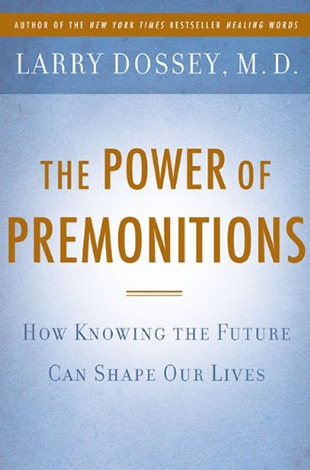"A premonition — from the Latin prae, 'before,' and monere, 'warn' — is literally forewarning. It is a glimpse of the future, a feeling or sense that something is about to happen. Premonitions are not explainable by inference from prior information or past experience. They come in many flavors. They may warn us of something unpleasant, such as imminent danger or a health crisis, or announce something agreeable, such as what the winning lottery numbers are or where to find a parking spot. Premonitions may be vague, or vivid and dramatic, as in a dream that contains complex characters and plotlines. They may occur while we are awake or asleep. We may be fully conscious of them, or they may be buried in our unconscious mind so deeply they prompt us to act without knowing why.
"The sheer heterogeneity of premonitions is dizzying, confusing, maddening. Why should premonitory dreams warn us one night of a national disaster, and the next night reveal where we lost our glasses? Why do they range from the trivial to matters of life and death? Why do some premonitions arrive in vibrant detail, while others are an imageless hunch or a vague intuition? And why do they turn up not just in humans but in animals as well? Premonitions are fickle; sometimes they are valid, but often are misleading. Why aren't they consistent? Why won't they respond when bidden? These are some of the questions we'll try to unravel.
"So as we begin, let's acknowledge that premonitions are utterly paradoxical; this will help us keep our balance as we explore this perplexing territory. A paradox is something that's considered to be senseless, logically unacceptable, or self-contradictory, but there are other views. My favorite comes from English essayist and novelist G. K. Chesterton, who said that a paradox is 'truth standing on its head to attract attention.' Maybe that's one reason why premonitions are so bizarre. If they weren't, we might not pay attention to them."
